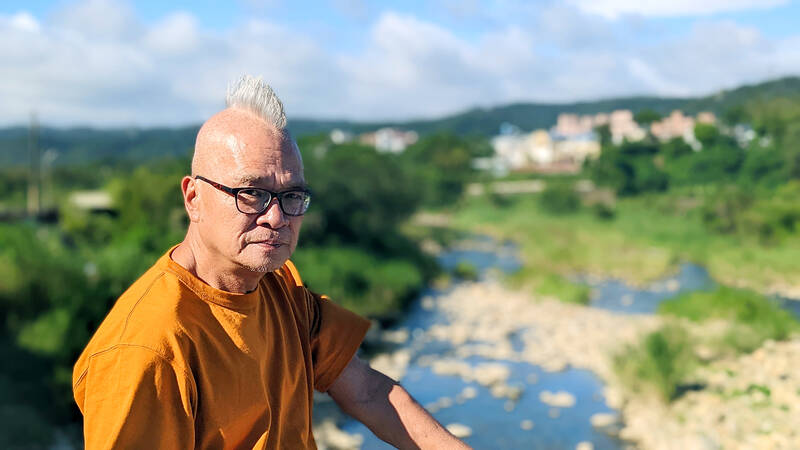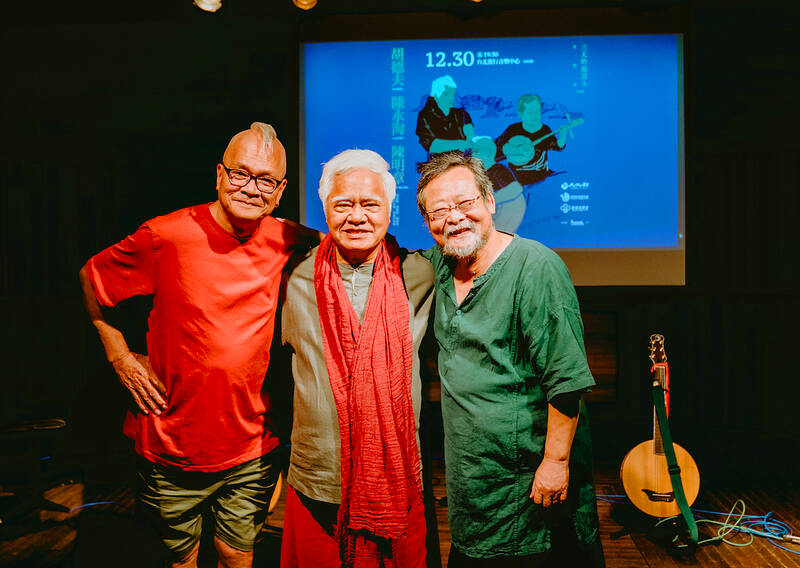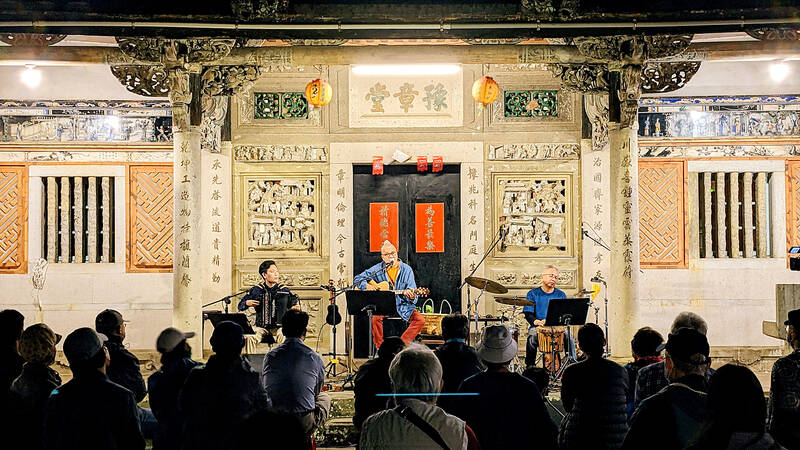Sporting a white mohawk, bright orange shirt and maroon pants, Chen Yung-tao (陳永淘) breaks into song on a bridge overlooking the Fengshan River (鳳山溪). It’s his Hakka-language rendition of a classic Hoklo (commonly known as Taiwanese) folk tune, Thinking About (思想起).
“I think about my hometown, ‘Pickled Vegetable Jar’ and how the clear stream in front of our house slowly, slowly, slowly flowed to the Fengshan River,” goes the first line.
“Pickled Vegetable Jar,” (鹹菜甕) as it was called in those days, is now the center of Guansi Township (關西) in Hsinchu County, where the 66-year-old Chen spent the first 13 years of his life. The singer-songwriter is back for an evening concert in the historic Lo Family Traditional School (羅屋書院). I was originally going to interview him at the venue, but Chen wanted to go for a walk, stopping at a bridge where he could see the spot where his childhood home once was.

Photo: Han Cheung, Taipei Times
“I like to set my songs in Guansi because I still have rich feelings for it,” he says. “There are a lot of stories I can tell, especially of how its environment has changed. For example, that small stream I just sung about is now a smelly sewer, almost all of Guansi’s wastewater passes through it.”
His rendition of Thinking About was created while preparing for next month’s “Three Greats of Taiwanese Folk Music” show at Taipei’s National Concert Hall, where he’ll share the stage with fellow songwriters Chen Ming-chang (陳明章) and Ara Kimbo, who is Paiwan and Puyuma. All three will be singing in their mother tongues.
“We each threw out songs from our repertoires for the other singers to play around with, and Cheng Ming-chang gave me Thinking About” by Chen Da (陳達), he says. “I used the chords, but applied my own language and interpretation, and created a new melody.”

Photo: Wang Wen-lin, Taipei Times
POLLUTED HOMETOWN
Chen Yung-tao isn’t always happy to return to Guansi. He’s afraid to visit the pond where he learned how to swim, as now it’s dirty and contaminated.
“It’s always mixed emotions. I see a lot of good stuff, but even more bad stuff,” he says. In the 1980s, an agrochemical factory was built upstream, and it took nearly an intense four-year struggle by residents and activists to stop its operations.

Photo: Han Cheung, Taipei Times
“For a while, this river was dead,” Chen says. “You couldn’t see any fish in it. Only when they finally chased out the factory, did it regain its vitality. You’d never see people fishing here before,” he says while greeting a spearfisher headed for the banks.
Suddenly discovering his calling as a songwriter after leaving congested Taipei at the age of 36, Chen draws inspiration from the natural environment.
“In my life, it’s not just my mother’s milk that nourished me, but also the rivers that irrigate the land,” he says. “If you pollute the river in front of your house, you pollute the downstream, you pollute the Taiwan Strait and you pollute the ocean. I really hope that we can be civilized enough to at least reflect on this.”
Chen actively participated in countless environmental and social protests in the past, but there’s little anger found in his songs.
“Musically, I prefer to portray the good parts, to bring back the feelings of warmth that have been lost,” he says. “There’s already a lot of voices of discontent, but my music is gentle. I like to use gentleness to resist hard steel.”
When I see his concert later that night at the Lo House, I realize that each song does have a distinct story. Some require intense research — he wrote Mountain Monkey after speaking to local Taiwanese soldiers who fought in the Japanese army during World War II. He gives sudden pop quizzes about the lyrics during the concert, and those who answer correctly take home a chili pepper plant from his garden.
WANDERING BARD
The upcoming concert’s Chinese title calls the three musicians “wandering bards” (吟遊詩人), and Chen certainly fits the description. As long as he has his guitar, he can work.
“I’m always creating on the move,” he says. “I come to Guansi a lot, and I also have places in (nearby) Emei and Nanjhuang. A lot of people invite me to stay at their places for a day or two. I’m quite impulsive — I’ll start thinking about what sort of fish I can catch at Dongyin (東引) island and I’ll go to Keelung, hop on a boat and head there.”
It wasn’t always like this for Chen. His family moved to Taipei when he was 13, and he made the capital his home well into his 30s. He recalls picking his son up from Zhongshan Elementary School (中山國小), which had more than 2,000 students in each grade. He could never find his child in the surging crowd and could only stand and wait, and he wondered: “Is he happy in this environment?”
“When I left, Taipei’s traffic was at its scariest,” he says. “I had three jobs and drove a jeep, but I decided to leave and let everything go.”
Chen moved north to the coastal township of Sanchih (三芝), where his grandfather joined him. That’s when he began using the Hakka language again. One day while helping a friend move, he noticed a boxed-up Yamaha guitar. His friend was surprised that he could play, and gave it to him.
His first song, Things of the Past (頭擺的事情), was not meant to be public. His grandfather was in poor health, and Chen wanted to make him some Hakka songs to help him think of the happy times of his childhood in Guansi.
“It felt as if a door opened when I sang it to him,” he says. “It’s like I was digging in a field, and the water started coming out by itself.”
His songs gained popularity when he moved to Beipu (北埔), where he began busking every weekend in front of Citien Temple (慈天宮), eventually attracting a dedicated local audience and drawing attention of visitors.
NEW INSPIRATIONS
Chen has released seven studio albums, the last one of which, Spinning Top (極樂, 2020), examines how people trapped in the rat race cannot escape the turning of fate.
“At every stage of your life, you see different things and have different thoughts,” Chen says. “Lately it’s the impact of the COVID-19 pandemic that’s changing people’s lives. I’m more of an optimist, though. No matter how serious the suffering is, I believe that it will pass.”
At the moment, he is inspired by his interactions with the other two “wandering bards.” While they’ve known each other for a long time, they’ve never had the opportunity to collaborate like this.
“You can’t force yourself to write songs, you can only do your best and face what’s in front of you. With Ara Kimbo and Chen Ming-chang, we had the chance to sing our hearts and souls out with our energies bouncing off each other. It was exhilarating,” he says.
Chen adds that he wants to try writing and singing in their mother languages too.
“If I feel that it’s right, I’ll write it,” he says. “I have a song called Waterways (水路) about the Tamsui River. While driving here today, I thought, maybe I can use Taiwanese to sing this song. I also have knowledge of several indigenous languages, and I could try that too.”

June 2 to June 8 Taiwan’s woodcutters believe that if they see even one speck of red in their cooked rice, no matter how small, an accident is going to happen. Peng Chin-tian (彭錦田) swears that this has proven to be true at every stop during his decades-long career in the logging industry. Along with mining, timber harvesting was once considered the most dangerous profession in Taiwan. Not only were mishaps common during all stages of processing, it was difficult to transport the injured to get medical treatment. Many died during the arduous journey. Peng recounts some of his accidents in

“Why does Taiwan identity decline?”a group of researchers lead by University of Nevada political scientist Austin Wang (王宏恩) asked in a recent paper. After all, it is not difficult to explain the rise in Taiwanese identity after the early 1990s. But no model predicted its decline during the 2016-2018 period, they say. After testing various alternative explanations, Wang et al argue that the fall-off in Taiwanese identity during that period is related to voter hedging based on the performance of the Democratic Progressive Party (DPP). Since the DPP is perceived as the guardian of Taiwan identity, when it performs well,

A short walk beneath the dense Amazon canopy, the forest abruptly opens up. Fallen logs are rotting, the trees grow sparser and the temperature rises in places sunlight hits the ground. This is what 24 years of severe drought looks like in the world’s largest rainforest. But this patch of degraded forest, about the size of a soccer field, is a scientific experiment. Launched in 2000 by Brazilian and British scientists, Esecaflor — short for “Forest Drought Study Project” in Portuguese — set out to simulate a future in which the changing climate could deplete the Amazon of rainfall. It is

Artifacts found at archeological sites in France and Spain along the Bay of Biscay shoreline show that humans have been crafting tools from whale bones since more than 20,000 years ago, illustrating anew the resourcefulness of prehistoric people. The tools, primarily hunting implements such as projectile points, were fashioned from the bones of at least five species of large whales, the researchers said. Bones from sperm whales were the most abundant, followed by fin whales, gray whales, right or bowhead whales — two species indistinguishable with the analytical method used in the study — and blue whales. With seafaring capabilities by humans